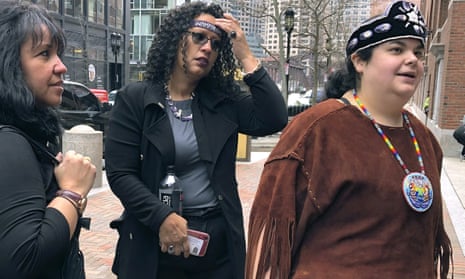A tribe is losing reservation status for its more than 300 acres in Massachusetts, raising fears among Native American groups that other tribes could face the same fate under the Trump administration.
The Mashpee Wampanoag tribe, which traces its ancestry to the Native Americans that shared a fall harvest meal with the Pilgrims in 1621, was notified late on Friday by the federal Bureau of Indian Affairs that it will be rescinding its reservation designation and removing the land from federal trust, according to Cedric Cromwell, the tribe’s chairman.
He said the move is “cruel” and “unnecessary” as the tribe and others across the nation are struggling to respond to the coronavirus pandemic within their sovereign lands.
The decision, if allowed to stand, would destroy much of what the tribe has worked to build in recent years on its sovereign lands, Cromwell said. That includes establishing an independent judicial system, police force and Wampanoag-language school, as well as beginning construction on a roughly 50-unit tribal housing development and breaking ground on a $1bn resort casino
“Talk about being blindsided. It was a sucker punch in the face from the bully you thought was your friend,” Cromwell said. “I thought they were calling to see how we’re doing in all of this. To do it at 4pm on a Friday during a pandemic? That’s sneaky.”
The US Department of the Interior, which oversees Native American affairs, is obligated by a recent federal court decision to remove the special land designations, which were bestowed in 2015 under then President Barack Obama, according to Conner Swanson, an agency spokesman.
In February, the US court of appeals in Boston upheld a lower-court decision declaring the federal government had not been authorized to take land into trust for the Cape Cod-based tribe.
The Mashpee Wampanoag tribe declined to challenge that decision, but Cromwell argues a separate lawsuit filed in federal court in Washington DC, is still pending.
The decision is the latest concerning sign that the Trump administration is willing to use its discretionary powers to attempt to take lands away from tribes, said Jean-Luc Pierite, of the North American Indian Center, a Boston-based advocacy group.
“This is an existential crisis for tribes,” Pierite said. “It’s a power grab and a land grab by the Trump administration.”
Former vice-president and now 2020 presidential candidate Joe Biden posted a protest on Twitter to the Trump move.
In the midst of a pandemic, the Trump Administration chose to expend effort to attempt to disestablish the Mashpee Wampanoag Tribe’s reservation. #IStandwithMashpee and with all of Indian Country. https://t.co/5Z6nZjClAf
— Joe Biden (@JoeBiden) March 31, 2020
Last April, the interior department withdrew trust status from lands owned by the Santa Ynez Band of Chumash Indians in California, citing the discovery of endangered bird species.
Congress eventually included a provision in a defense spending bill in December declaring that the more than 1,400 acres of land would be held in trust for the tribe to build housing.
Swanson stressed the Mashpee Wampanoag tribe retains its federal recognition, which it earned in 2007.
The tribe’s more than 300 acres – about half of which are located in the town of Mashpee and the other half in Taunton near the Rhode Island state line – also remain in the tribe’s ownership, as it had before the federal government took them into trust, he noted.
Cromwell promised the tribe would continue its decades-long land fight.
“These are the lands of our ancestors, and these will be the lands of our grandchildren,” he said. “We will not rest until we are treated equally with other federally recognized tribes and the status of our reservation is confirmed.”
